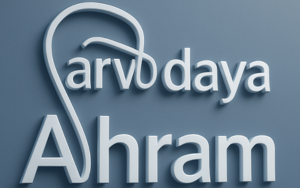Sarvodaya Ashram: Targeted Intervention Project in Hardoi, Uttar Pradesh
Introduction
Sarvodaya Ashram, located in Tadiyawan, Hardoi (U.P.), is a reputed NGO working for the upliftment of marginalized communities in rural Uttar Pradesh. Under the aegis of Uttar Pradesh State AIDS Control Society (UPSACS) and the National AIDS Control Organization (NACO), it is implementing a vital Targeted Intervention (TI) Project for HIV/AIDS prevention and harm reduction.
This TI project focuses on high-risk and vulnerable populations, including:
- Female Sex Workers (FSWs)
- Men who have Sex with Men (MSM)
- Transgender Persons (TGs)
- People Who Inject Drugs (PWID)
What is a Targeted Intervention (TI) Project?
Targeted Interventions are strategic programs under National AIDS Control Programme (NACP) designed to provide preventive, curative, and referral services to populations most at risk of HIV transmission.
The project’s aim is to reduce HIV transmission, enhance early detection, provide linkages to treatment, and empower communities through peer-led outreach.
Implementation in Hardoi District
Hardoi is a large, socio-economically backward district in Uttar Pradesh with high levels of migration, poverty, and social stigma—conditions that create risk environments for HIV/AIDS among key populations. Sarvodaya Ashram’s TI project is strategically spread across:
- Urban slums and market areas (Hardoi city)
- Transport hubs and highways (e.g., Bilgram, Sandila)
- Semi-urban zones and rural belts (e.g., Shahabad, Tadiyawan)
Targeted Populations & Interventions
1. Female Sex Workers (FSWs)
Sarvodaya Ashram works with over 500 registered FSWs, offering:
- Condom distribution & promotion
- Regular health camps and STI screenings
- Peer education for behavior change
- Linkage to HIV testing, ART centers, and welfare schemes
- Legal aid & crisis support for gender-based violence
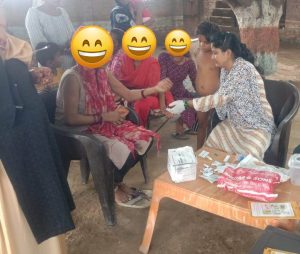
2. Men who have Sex with Men (MSM)
The MSM population faces high HIV vulnerability due to
multiple sexual partnerships and stigma. Services include:
- HIV and STI screening through outreach
- Provision of lubricants and condoms
- Sensitization about rights and mental health
- Mobilization for ART and ICTC services
- Engagement through safe spaces and group meetings
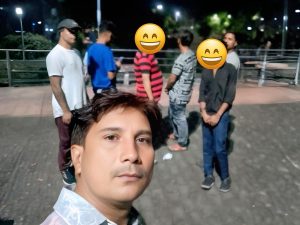
3. Transgender Persons (TGs)
Transgender individuals, often socially excluded, receive targeted support through:
- Identification and mapping of TG hotspots
- Gender-sensitive counseling
- HIV testing through community-based screening
- Referral to TG-friendly healthcare facilities
- Empowerment through identity recognition and inclusion in govt. schemes.
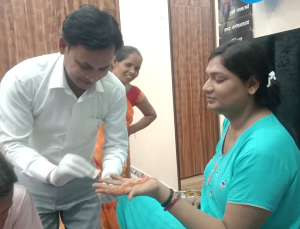
4. People Who Inject Drugs (PWID)
PWIDs face HIV risk through shared syringes and unsafe injection practices. The project supports them through:
- Needle Syringe Exchange Program (NSEP)
- Opioid Substitution Therapy (OST) linkage
- Counseling on safe injecting practices and overdose prevention
- HIV, Hepatitis B & C testing
- Detox and rehabilitation referrals in partnership with hospitals
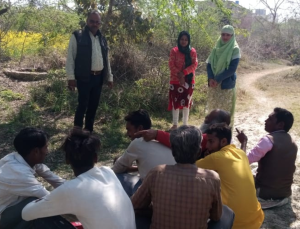
Key Components of the TI Project
A. Outreach & Peer-Led Interventions
- Recruitment of Peer Educators (PEs) from the community
- One-on-one and group sessions to discuss HIV risks
- Behavioral change communication using culturally relevant tools
B. Health & Clinical Services
- STI symptom management through project-linked clinics
- Regular health camps in collaboration with district hospitals
- Referral to Integrated Counselling and Testing Centres (ICTCs)
- Linkage to ART centers for PLHIVs
C. Condom & Lubricant Promotion
- Free and socially marketed condom distribution
- Accessibility through community depots and ORW networks
- Promotion of water-based lubricants for MSM and TGs
D. HIV Testing and Linkages
- Community-Based Screening (CBS) and Mobile ICTC camps
- Immediate referral of positive cases to ART centers
- Follow-up for treatment adherence and CD4 count monitoring
E. Crisis Management & Social Support
- Redressal of violence, harassment, and stigma
- Strong local coordination with police, legal aid, and shelters
- Facilitation of identity cards, voter IDs, ration cards for TGs and FSWs
Support from UPSACS and NACO
The program is funded and monitored by:
- NACO: Policy formulation, national-level guidance, and funding
- UPSACS: Training, supervision, and M&E at the state level
They provide tools for:
- Capacity building of project staff
- Monitoring using SIMS portal, CMIS, and regular field visits
- Quarterly and annual evaluation audits
Major Achievements in Hardoi
- Over 90%+ coverage of identified key population in the district.
- Drop in STI prevalence and risky behaviors.
- Improved linkage rate to HIV treatment and OST centers.
- Formation of support groups among TGs and MSM communities.
- Successful sensitization of police and healthcare workers.
Future Priorities
- Scaling the intervention to hidden and hard-to-reach key populations.
- Integration with mental health, nutrition, and livelihood programs.
- Use of digital platforms for outreach and follow-ups.
- Increase ART adherence rate and reduce dropouts.
Conclusion
Sarvodaya Ashram’s TI project in Hardoi stands as a beacon of inclusive public health practice, addressing the most neglected and stigmatized communities with dignity and scientific precision. With continued support from UPSACS and NACO, the project is not only reducing HIV transmission but also empowering key populations to live healthier, more dignified lives.
This grassroots effort aligns with India’s goal of achieving the UNAIDS 95-95-95 targets and building a zero-discrimination, HIV-free society.
